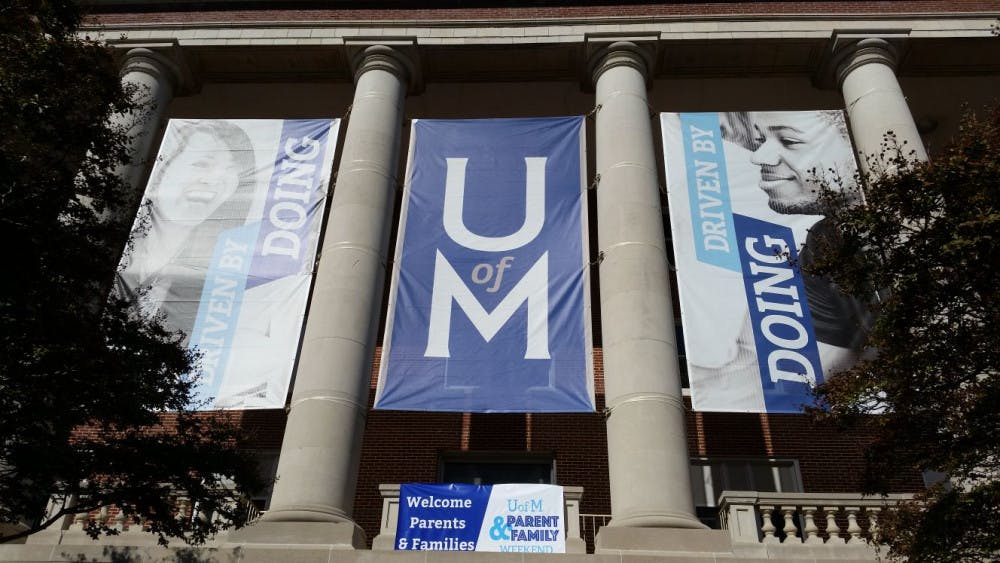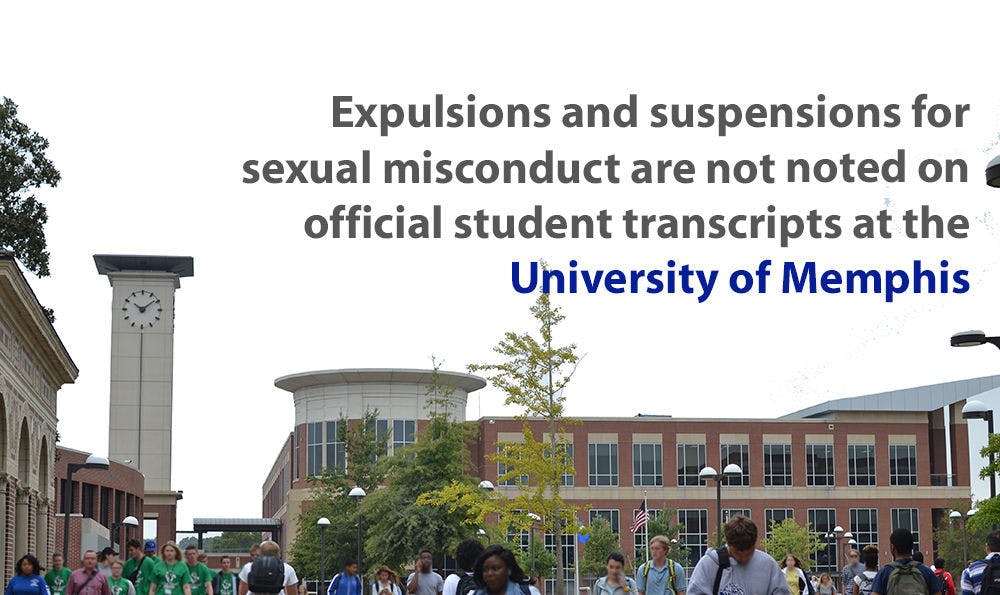How the University of Memphis deals with sexual assaults on campus varies, and is usually hidden from public view.
When a U of M student who’s been sexually assaulted by a fellow student goes to police, an investigation is launched and often times an arrest warrant carried out. The crime becomes public record.
At the same time, the university will launch its own investigations and make its own ruling on the guilt of the attacker. But unlike the police, the U of M’s entire process is done behind closed doors.
And, if the sexual assault survivor chooses to not report the crime to police, then how (or if) the university punishes an alleged attacker will likely remain a secret.
Understanding the University’s closed-door policies on sexual assault when police are not involved is crucial because for every victim of sexual violence that goes to the police, there likely are dozens who remain silent.
Many are aware of 19-year-old U of M freshman, Shaquille Brown, who was arrested for sexual battery last week after a female student stepped forward.
Brown allegedly grabbed, groped and threatened the female student after she turned down his advances at a university dorm in mid-October.
She reported him first to U of M’s Department of Police Services. Campus police then reported him to city police who arrested him.
This made the rounds on local television news.
What many don’t know is that around the same time that this attack occurred, two sexual offenses were reported on the U of M campus.
In both cases, the victims were attacked in U of M dorms. They sought help from the University’s health or the counseling center, and both were referred to Rape Crisis. But the students in both cases did not want to report their attacks to campus police.
(University staff and faculty are required to tell campus police if student has been sexually assaulted. However, the student can refuse to file a report with authorities, which means that there will only be a note in campus police records that the attack occurred.)
Cases like these will likely be handled in closed-door meetings and negotiated outside the reach of the public or journalists.
Limited punishment for attackers

Â
Even when the University of Memphis suspends students for sexual assault, it is possible for the assailants to transfer to other universities without anyone finding out about their crime.
That’s because the Tennessee Board of Regents policy does not require universities to note suspensions on transcripts, explained Ryan Van Dusen, associate dean of the Office of Student Conduct.
Expulsions are noted in student transcripts, but unless the student signs a waiver allowing a potential employer or another university to see the reason for the expulsion, the record is sealed.
That’s because many universities across the country, including the U of M, view these records as protected under the Family Educational Rights and Privacy Act or FERPA.
FERPA was created to make student academic records confidential, but many universities have interpreted the law to include disciplinary records, like expulsions and suspensions due to sexual assault. This interpretation of the law is somewhat shaky. Universities in New York and Virginia will note on a students’ transcript if they were suspended or expelled for sexual misconduct.
While many groups like the Student Press Law Center are fighting this view of the law, it is unlikely to change any time soon.
For now, unless the sexual assault survivor goes to police, many attackers will see no criminal charges and most people will not know of the attack.
Not going to policeÂ

Â
Students who are sexually assaulted are always encouraged to go to the police first, Van Dusen said.
“We can only protect a student on campus. There’s little we can do if they interact off campus,†he said. “We encourage a student to go to police.â€
However, student sexual assault survivors many times choose to only file a complaint with the University of Memphis. There are several reasons for this.
“In some ways this process is easier,†he said. “The court system can take years. If it’s pretty clear-cut of what happened, we can move much faster. We could remove the threat from campus.â€
The university only needs a preponderance of evidence that the attack occurred to punish an alleged attacker, Dusen said. This bar is much lower than in the criminal justice system.
Reporting the crime to police and going through the legal process may re-victimize the student, he said.
However, “Most people who commit sexual assault don’t just do it one time,†Dusen said. “By going to the police, you could stop the cycle of violence.â€
Another reason students often don’t want to go to police is that they perceive the incident as minor, said Latosha Dexter, interim director for the U of M’s Office of Institutional Equity. These students would rather the university discipline these cases, she said.
Sexual misconduct is not just rape or sexual assault, Dexter said, it also includes dating violence, stalking and domestic violence.
But even in very serious sexual assault cases, some students don’t want to go through the process, Dexter said.
“Being a ‘rape victim’ is still a term people use instead of ‘rape survivor,’†she said. “So there is still a negative stigma attached to sexual assault survivors ... The process itself can be traumatizing. They have to be willing to have conversations about something awful and intimate that happened to them. That’s why it’s the survivors’ choice whether they choose to make the police report.â€
How a Title IX investigation works
Claims of sexual misconduct occurring between two students are investigated through the U of M’s Office of Institutional Equity.
Every investigation is handled differently depending on the nature of the allegation, said Dexter, interim director for the office.
Read the University of Memphis' policy on handling sexual misconduct here.Â
“There are different steps that are taken in sexual harassment versus a sexual misconduct investigation. It also depends on the level of the sexual misconduct,†she said.
In the typical process, a rape or sexual assault survivor — which the university calls a “complainant†— comes to the office and tells a “Title IX Coordinator†what happened, Dexter said.
These coordinators have several responsibilities under Title IX of the Education Amendments of 1972. But part of their job is to investigate claims of sexual misconduct or appoint someone else.
Dexter and Ceecy Reed, who both work in the Office of Institutional Equity, are Title IX Coordinators and run investigations for the U of M.
“We try to get all of the facts — the ‘who,’ ‘what,’ ‘when,’ ‘where’ and ‘why,’†Dexter said.
Students suspected of sexual misconduct — what the university calls “respondents†— are asked to come tell their side of the story.
Emails, text messages and other forms of communication are reviewed by investigators.
“Both parties are allowed to provide witnesses to be interviewed as well,†Dexter said.
Everyone is asked to give written statements, but suspects, survivors and witness can decline to be interviewed in the investigation.
Interim measures
The university lays out a policy of no contact between the attacker and survivor. This and several other actions can be taken by the investigator if deemed necessary.
“A conversation we have with the complainant on the front end is ‘Do you feel safe going to class?’ ‘Do you have any classes with the alleged perpetrator?’†Dexter said. “We put interim measures into place to make sure everyone feels protected.â€
These measures include allowing victimized students to move to a different dorm, change classes, retake courses or withdraw from classes they may share with the attacker. They can also request a university official walk with them between classes.
The attacker can be suspended from school until the outcome of the investigation.
University discipline
Ultimately, the investigator decides whether the alleged attacker will be punished. At the end of the investigation, a report is sent to both the attacker and survivor. If the attacker is a student, how they are punished falls into the hands of the Office of Student Conduct.
They can be put on probation, suspended for up to three years, expelled or receive some other form of disciplinary action.
The attacker has the right to appeal the decision to the hearing officer, and to the president of the University.
Unlike in other disciplinary hearings, the victims of sexual misconduct are allowed to appeal the decision.






